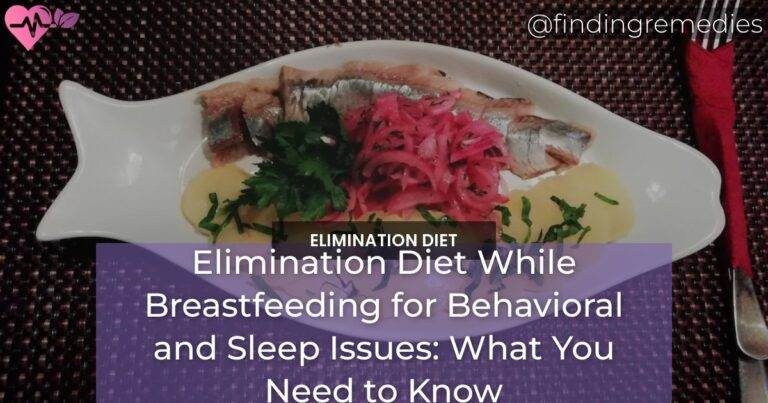Are you a breastfeeding mother looking for ways to help improve your baby’s sleep and behavior? You may have heard of an elimination diet as an option. An elimination diet is when foods are removed from a person’s diet to see if it has an effect on their symptoms. While it’s not a popular option for babies and children, it can help breastfeeding mothers understand their baby’s sensitivities.
In this article, we’ll discuss the details of an elimination diet while breastfeeding for behavioral and sleep issues and what you need to know. We’ll look at the benefits, the potential risks, and how you can go about it. By the end of the article, you’ll have a better understanding of how an elimination diet can help your baby and how to do one safely.
Table of Contents
Overview of Elimination Diet
An Elimination diet is a dietary regimen in which specific foods are eliminated from the diet to determine if they cause any adverse reactions. This is done to identify food sensitivities or allergies that may be affecting a person’s health.
What is an elimination diet?
An elimination diet is a temporary diet that involves removing specific foods from your diet for a period of time, usually two to four weeks. After the elimination period is over, the foods are gradually reintroduced to the diet to determine which foods are causing the problem.
Why is it used?
Elimination diets are used to identify food sensitivities or allergies that may be causing health issues such as behavioral and sleep issues.
Breastfeeding and Elimination Diet
Is it safe to do an elimination diet while breastfeeding?
Yes, it is safe to do an elimination diet while breastfeeding. However, it is important to do it under the guidance of a healthcare professional, such as a registered dietitian, to ensure that both the mother and the baby are getting the necessary nutrients.
How does an elimination diet affect breast milk?
An elimination diet may affect breast milk by reducing the allergens that may be passed to the baby through breast milk. However, it is important to ensure that the mother is getting enough nutrients while on the elimination diet to support breastfeeding.
ALSO READ
Behavioral Issues in Babies
How can an elimination diet help with behavioral issues in babies?
An elimination diet can help with behavioral issues in babies by identifying any food sensitivities or allergies that may be contributing to the problem.
What are the common behavioral issues in babies?
The common behavioral issues in babies include colic, irritability, fussiness, and hyperactivity.
Sleep Issues in Babies
How can an elimination diet help with sleep issues in babies?
An elimination diet can help with sleep issues in babies by identifying any food sensitivities or allergies that may be contributing to the problem.
What are the common sleep issues in babies?
The common sleep issues in babies include difficulty falling asleep, frequent waking, and restless sleep.
Types of Allergens
What are the common allergens?
The common allergens include protein, gluten, dairy, soy, eggs, and nuts.
How do they affect babies?
These allergens can affect babies by causing allergic reactions such as rashes, hives, and digestive issues.
Identifying Allergies in Babies
How can you identify an allergy in a breastfed baby?
An allergy in a breastfed baby can be identified through symptoms such as rashes, hives, vomiting, diarrhea, and colic.
What are the common symptoms of an allergy?
The common symptoms of an allergy include rashes, hives, vomiting, diarrhea, and colic.
Elimination Diet for Specific Symptoms
Can an elimination diet help with colic symptoms?
Yes, an elimination diet can help with colic symptoms by identifying any food sensitivities or allergies that may be contributing to the problem.
Can an elimination diet help with reflux symptoms?
Yes, an elimination diet can help with reflux symptoms by identifying any food sensitivities or allergies that may be contributing to the problem.
Can an elimination diet help with constipation symptoms?
Yes, an elimination diet can help with constipation symptoms by identifying any food sensitivities or allergies that may be contributing to the problem.
Can an elimination diet help with ear infections?
An elimination diet may help with ear infections by reducing inflammation in the body that may be contributing to the problem.
Can an elimination diet help with skin rashes?
Yes, an elimination diet can help with skin rashes by identifying any food sensitivities or allergies that may be contributing to the problem.
Can an elimination diet help with asthma symptoms?
An elimination diet may help with asthma symptoms by identifying any food sensitivities or allergies that may be contributing to the problem.
Conclusion
In conclusion, an elimination diet can be a useful tool for identifying food sensitivities or allergies that may be contributing to behavioral and sleep issues in breastfed babies. However, it is important to do it under the guidance of a healthcare professional to ensure that both the mother and the baby are getting the necessary nutrients. By identifying and eliminating allergens from the maternal diet, it may be possible to improve the health and well-being of both the mother and the baby.
RELATED ARTICLES:

